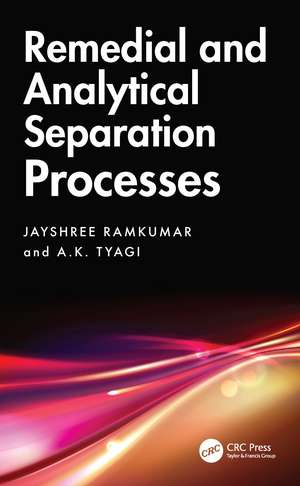Remedial and Analytical Separation Processes
Autor Jayshree Ramkumar, A.K. Tyagien Limba Engleză Hardback – 15 noi 2024
Features:
- Provides synchronous aspects of the separation process for remediation, including phytoremediation and analysis using chromatography
- Addresses basic separation techniques for water solutions
- Discusses mechanistic views of various separation processes
- Includes the mechanism of separation using membranes and sorbents
- Helps the reader understand the connection between the different discrete separation processes
Preț: 725.80 lei
Preț vechi: 885.13 lei
-18% Nou
Puncte Express: 1089
Preț estimativ în valută:
138.90€ • 150.82$ • 116.67£
138.90€ • 150.82$ • 116.67£
Carte tipărită la comandă
Livrare economică 23 aprilie-07 mai
Preluare comenzi: 021 569.72.76
Specificații
ISBN-13: 9781032458854
ISBN-10: 1032458852
Pagini: 148
Ilustrații: 32
Dimensiuni: 156 x 234 mm
Greutate: 0.39 kg
Ediția:1
Editura: CRC Press
Colecția CRC Press
Locul publicării:Boca Raton, United States
ISBN-10: 1032458852
Pagini: 148
Ilustrații: 32
Dimensiuni: 156 x 234 mm
Greutate: 0.39 kg
Ediția:1
Editura: CRC Press
Colecția CRC Press
Locul publicării:Boca Raton, United States
Public țintă
Academic and PostgraduateNotă biografică
Jayshree Ramkumar obtained her MSc (Analytical Chemistry) in 1993 from Madras University, Chennai and joined Bhabha Atomic Research Centre (BARC) Training School, Mumbai in the same year. After completing one year orientation course in Nuclear Science and Technology, she joined the Analytical Chemistry Division of BARC in 1994. She is also an Associate Professor (Chemistry) at Homi Bhabha National Institute (HBNI), Mumbai. She has been involved in research in areas of separation science and analytical chemistry. Her PhD was on the studies using Nafion membranes and bulk liquid membrane for achieving separation of various species like metal ions and organic compounds. She was awarded MANA fellowship for carrying out postdoctoral research at National Institute of Materials Science, (NIMS) Tsukuba, Japan. Her work involved the synthesis of mesoporous materials for applications as sorbents for removal of toxic species. She has been collaborating with universities through the BRNS and AERB projects as the principal collaborator. She has reviewed BRNS, AERB and DST project proposals for their suitability for funding. She is member of Doctoral committee of HBNI, Editorial board of journals and serves as external examiner for PhD students of different Universities. She has more than 75 publications including papers in international journals and book chapters to her credit.
A. K. Tyagi joined Chemistry Division, BARC in 1986 through BARC Training School and received Ph.D. degree in 1992. He did postdoctoral research at Max-Planck Institute, Stuttgart, Germany (1995-96). He occupied various positions at BARC such as Director, Chemistry Group, Director, Bio-Science Group, Head, Chemistry Division etc. He was a Distinguished Scientist, DAE. Presently, he is Dean, Homi Bhabha National Institute (HBNI), Mumbai and Honorary Professor at JNCASR, Bengaluru. His research interests are in the field of nanomaterials, functional materials, nuclear materials, metastable materials and Hybrid materials. He has to his credit 47 PhD students (awarded: 36, Submitted: 3 and ongoing: 8) and about 650 papers in journals. He has been conferred with a number of awards such as such as DAE-Homi Bhabha Science and Technology Award, DAE-SRC Outstanding Researcher Award, MRSI Medal; MRSI-ICSC Materials Science Senior Award; MRSI-CNR Rao Prize in Advanced Materials; MRSI Distinguished Materials Scientist of the year award ; CRSI Bronze Medal and so forth. He is a Fellow of several national and international science academies such as National Academy of Sciences, India (FNASc); Indian Academy of Sciences (FASc); Indian National Academy of Engineering (FNAE); Indian National Science Academy (FNA); Royal Society of Chemistry (FRSC) and The World Academy of Sciences (FTWAS).
A. K. Tyagi joined Chemistry Division, BARC in 1986 through BARC Training School and received Ph.D. degree in 1992. He did postdoctoral research at Max-Planck Institute, Stuttgart, Germany (1995-96). He occupied various positions at BARC such as Director, Chemistry Group, Director, Bio-Science Group, Head, Chemistry Division etc. He was a Distinguished Scientist, DAE. Presently, he is Dean, Homi Bhabha National Institute (HBNI), Mumbai and Honorary Professor at JNCASR, Bengaluru. His research interests are in the field of nanomaterials, functional materials, nuclear materials, metastable materials and Hybrid materials. He has to his credit 47 PhD students (awarded: 36, Submitted: 3 and ongoing: 8) and about 650 papers in journals. He has been conferred with a number of awards such as such as DAE-Homi Bhabha Science and Technology Award, DAE-SRC Outstanding Researcher Award, MRSI Medal; MRSI-ICSC Materials Science Senior Award; MRSI-CNR Rao Prize in Advanced Materials; MRSI Distinguished Materials Scientist of the year award ; CRSI Bronze Medal and so forth. He is a Fellow of several national and international science academies such as National Academy of Sciences, India (FNASc); Indian Academy of Sciences (FASc); Indian National Academy of Engineering (FNAE); Indian National Science Academy (FNA); Royal Society of Chemistry (FRSC) and The World Academy of Sciences (FTWAS).
Cuprins
1. Introduction to Environment Alteration and Reshaping 2. Separation Process: Imperative to Human Life 3. Membrane Separation: Primordial Water Treatment Technique 4. Sorption: Backbone of Separation Science 5. Phytoremediation: An Emerging Green Auxillary Technique 6. Chemical Precipitation, Coagulation, and Flocculation: Triad of Great Versatility 7. Chromatographic Techniques: Workhorse of Analytical Chemistry 8. Broad conclusions and Future Perspectives
Descriere
This book describes comprehensive, integrated view of separation science backed by discussions about simple extraction and partition processes to give better understanding of chromatography and membrane separations. It paves way for understanding of fundamental physical and chemical phenomena involved in separations and transport reactions.
